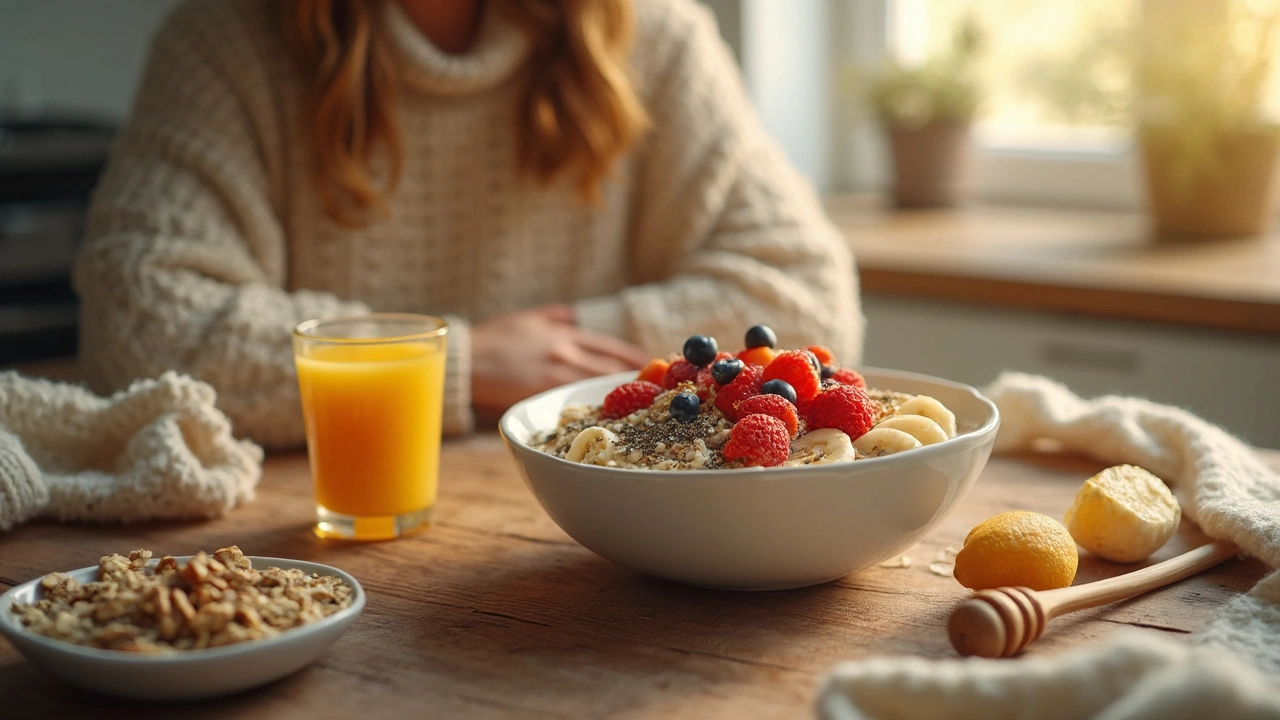
The Real Story: Does Oatmeal Actually Help Detox Your Body?
So many people scroll through health blogs and find oatmeal listed under "detox miracle foods." Honestly, it's easy to see why. Oatmeal is cozy, cheap, and has a wholesome vibe that screams "I'm good for you!" But if you're picturing oatmeal sweeping toxins out of your system like a magic mop, slow down. Let's dig into what actually happens in your body when you eat oatmeal, and what "detox" really means in a scientific sense.
First, our bodies already have a built-in detox system. Yep, your liver, kidneys, skin, and even your lungs work round the clock to break down and filter out stuff that shouldn't hang around. Oatmeal doesn't take over their job; it's not a substitute for any organ. But here's where it gets interesting: oatmeal can support your body's natural detox processes, especially through your gut. The kind of fiber in oats is called beta-glucan, and it's legit. One big 2016 study in the journal Nutrients showed that beta-glucan helps remove cholesterol and may bind with some toxins so your body flushes them out more easily. That's not just a wellness buzzword; it's actual gut science.
Now, listen—don't fall for detox diets that want you to eat oats and nothing else for three days. That's just setting yourself up for headaches, mood swings, and probably a hatred for oatmeal. What makes oatmeal helpful isn't that it's exclusive; it's the soluble fiber, B-vitamins, magnesium, and antioxidants working in your digestive system that support a healthy environment for your real detox organs.
Also, let's clear something up: oatmeal won't cure a wild weekend, fix all your junk food sins, or "reset" your body in 24 hours. It's not a quick fix. But, if your plan is to swap sugary breakfast cereals out for a steaming bowl of oats, you are supporting your body, feeding good gut bacteria, giving your liver a break from excess sugar, and keeping your energy balanced. That adds up over time. And if you're wondering, pet owners, Luna (my dog) can't have oatmeal because of belly issues, but Ziggy the parrot loves picking at plain oats—just goes to show it's gentle stuff (talk to your vet before trying it with pets though!).
Beyond the gut, oats bring along several micronutrients—like manganese, phosphorus, and a sprinkle of iron and zinc. They won't detox you all on their own, but they help your metabolism do its job, keep your digestive tract moving, and make you feel (and, let's be real, look) less puffy and blah when your system is overloaded.
| Nutritional Content per 1 cup cooked oats | Amount |
|---|---|
| Calories | 154 |
| Soluble Fiber | 2g |
| Protein | 6g |
| Iron | 2mg |
| Magnesium | 63mg |
One more fascinating thing: beta-glucan can even help calm down post-meal blood sugar spikes, according to a 2018 study by the American Society for Nutrition. That means if you feel tired or jittery after a carb-heavy breakfast, oatmeal lets your glucose trickle in slowly. This is huge for people trying to get their energy back after eating too much processed food, and it makes oatmeal perfect for a gentle "reset" meal.
So, while oatmeal won't scrub out every toxin (nothing will, honestly), it's a fantastic player in your lineup—especially if you're replacing processed grains or sugars. The comfort and satisfaction factor isn't a detox miracle, but it's definitely a vibe your body appreciates.

How Oatmeal Boosts Gut Health and Supports Cleansing
Your gut is like a bustling city, full of good, helpful bacteria and—sometimes—invaders or debris you don't want. When we talk about foods that "detox," we're really talking about foods that help the gut do its thing efficiently. Oatmeal's big power move is its fiber: both soluble and insoluble. Most of the show is run by soluble fiber, which acts almost like a sponge, grabbing cholesterol, sugar, and even some waste before your body absorbs too much. Think of it as your gut’s best friend during a cleanse.
But the story doesn’t stop there. The fiber acts as a prebiotic, meaning your healthy gut bacteria get a literal feast from every bowl. When these bacteria chow down, they release short-chain fatty acids. This isn't just biology trivia—these fatty acids help lower inflammation and may even protect your colon. If you’re someone who gets easily bloated or run down after junk food benders, those short-chain fatty acids are like a repair crew for your digestive lining.
Have you ever heard that slow, steady moves win the race? That’s the philosophy behind oats. Because oats digest slowly, they keep your blood sugar stable, and this means your body isn’t scrambling to fix a sugar rush mess—allowing you to focus resources on repair rather than busywork. And—cool fact—several doctors at Johns Hopkins have recommended oats for patients recovering from stomach bugs, simply because it soothes inflammation without being heavy or harsh.
Now, if you’re serious about "detoxing" your system, hydration matters just as much as what you eat. Oats absorb liquid (and the fiber draws water into your bowel), which eases constipation and helps you flush out anything your body wants to leave behind. Pair oats with a big glass of water or even herbal tea—it makes a big difference. People who add chia seeds, berries, or kiwi to their oatmeal get that extra fiber kick, helping speed things along in your gut without any cramping drama. If you need inspiration, my favorite morning bowl mixes oats with frozen wild blueberries and a squeeze of lemon for flavor and extra antioxidant punch.
Speaking of antioxidants, oatmeal is a sneaky good source of avenanthramides. These compounds are honestly underappreciated—they fight free radicals, which are the unstable molecules that can damage your cells during times of stress or poor diet. It’s like a mini internal clean-up service. In fact, the anti-inflammatory nature of oats is why some people use oat baths to relieve itchy skin—what works on your outsides might just be working inside, too.
Oatmeal is also really forgiving if you have a sensitive stomach. It’s free of gluten if you buy certified gluten-free oats (trust me, this matters if you ever watched a friend suffer after cross-contaminated grains). It’s also naturally low in fat and added sugar if you skip the instant packets with syrupy fruit goop. Want to bulk up the nutrient profile? Swirl in ground flaxseed, nuts, or pumpkin seeds for more minerals and healthy fats. You end up eating in a way that’s gentle and nourishing, which is what your body needs when you’re trying to clear out the gunk (not through harsh laxatives, but through daily smart choices).
Quick pro tip for DIY "detox" oatmeal: avoid adding sweetened yogurt, processed peanut butter, or chocolate chips. Go for fresh fruit, nuts, or even a dash of cinnamon and turmeric—mild, grounding spices that help with inflammation without overwhelming your taste buds. And if you want a savory bowl? Stir in pumpkin puree and a sprinkle of cumin for a twist you’ll actually crave again.
- Start simple: Keep the initial recipe basic—oats, water (or unsweetened non-dairy milk), maybe a pinch of sea salt.
- Add fiber boosts: Mix in chia seeds, ground flax, or fresh fruit to increase both bulk and micronutrients.
- Experiment with herbs and spices: Ginger, cinnamon, cardamom, and turmeric not only taste great but have their own "cleanse" reputations.
- Stay hydrated: For every serving of oats, make sure you’re drinking extra water to help the fiber work its magic.
Oatmeal supports healthy gut bacteria, helps move things along naturally, and soothes your digestive system—all points in its favor if you’re aiming for gentle, sustained detox rather than a strict, punishing cleanse.

How to Make Oatmeal Work for Your Cleansing Diet: Tips and Science-Backed Recipes
So, you’re convinced oatmeal is a solid detox supporter—but how do you fold it into your daily eating so you actually feel the benefits? Forget bland or boring. There are so many ways to serve oatmeal, each bringing its own bonus if you want to amp up your cleanse. But first, let's squelch that myth that more is always better; eating mountains of oatmeal won't detox your system faster. It’s about frequency, quality, and smart pairings.
Starting with frequency: most dietitians recommend swapping in oats for one meal a day, like breakfast or lunch. This simple change cuts out added sugars and junky fats found in most commercial breakfasts. Oatmeal’s slow-release fiber helps you avoid that "hangry" feeling by 10 a.m. Plus, if you eat on a schedule, your gut bacteria thrive—they love predictability, as shown in a recent Stanford gut study from 2023.
Next—quality. Choose whole rolled oats or steel-cut oats for maximum fiber. Instant oats are more processed and often come with sneaky added sugars. Cooking oats in water is the most liver-friendly move, but plant-based milks (almond, oat, coconut) work if you want creaminess. If you’re worried about glyphosate or other chemical residues (a big conversation in oat farming), stick to organic certified oats. It can make a difference for peace of mind.
Now, let’s talk about creative, cleanse-friendly add-ins:
- Berries: Packed with vitamin C and antioxidants, they help fight inflammation.
- Apples: Their skin is full of pectin, a prebiotic fiber.
- Citrus zest: Lemon or orange rind brings a boost of phytonutrients.
- Ginger or cinnamon: Both have anti-inflammatory effects and can help with blood sugar.
- Pumpkin puree or grated carrot: Vitamins, fiber, and a fun texture twist.
- Unsweetened coconut flakes: For healthy fats and a taste of the tropics.
Get bored easily? Try these science-backed oatmeal detox recipes:
- Blueberry-Lemon Oatmeal: Cook 1/2 cup oats in water, stir in 1/2 cup frozen blueberries and a swipe of lemon zest at the end, and top with a few crushed walnuts.
- Carrot Cake Cleanse Bowl: Cook your oats, then add grated carrot, raisins, a little cinnamon, and top with pumpkin seeds.
- Matcha Green Oatmeal: Whisk a teaspoon of matcha powder into cooking oats for an energy and antioxidant boost.
- Gut-Soother Oatmeal: Use chopped apple, fresh ginger, and a swirl of chia seeds, then finish with a little chopped mint for digestion.
If you’re not a morning eater, oatmeal works for lunch or even as a snack. Overnight oats (uncooked oats soaked in water or non-dairy milk overnight in the fridge) make a portable, quick option for busy days. They retain all their fiber and, according to a 2021 Harvard Medical School review, may help regulate your gut rhythm even more efficiently than hot oats thanks to their "raw" fiber content.
Don’t forget to avoid drowning your oatmeal in honey, brown sugar, or sugary nut butter. That undoes all the cleansing benefits and can upset your blood sugar. If you need a hint of sweetness, go for sliced banana, diced pear, or, once in a while, a light drizzle of pure maple syrup.
One more tip: listen to your stomach and energy. If you feel sluggish, try cutting down on portion size or adding a bit more protein—like a sprinkle of hemp seeds or a spoonful of plain Greek yogurt. Oatmeal works for almost any dietary pattern: vegan, gluten-free, low-FODMAP, low-sugar—you name it. That makes it perfect for anyone who wants a gentle, no-drama detox assist without rigid meal plans or scary ingredient lists.
So next time TikTok tells you oatmeal is either "magically detoxifying" or pointless, you’ll know the truth: it’s steady, reliable support for your body’s natural cleaning crew. It brings comfort, satisfaction, and gut-friendly fiber right to your bowl. This is the kind of food that’s been trusted for generations—your grandma wasn’t wrong after all. Just don’t forget your glass of water. Oats love company.


10 Comments
I've always enjoyed oatmeal for its simplicity and the satiating quality it offers. It's interesting to see this post delve into the actual science behind its detox claims because so often 'detox' gets tossed around as a marketing buzzword.
The fiber in oats definitely supports digestion, which can help the body's natural detox pathways work efficiently. But I think it's important we remember that oatmeal alone isn't a magic fix; it's more about incorporating it into a balanced diet.
Adding nuts or berries to oatmeal can boost its nutritional value too. Have you tried any particular toppings that you think maximize oatmeal's benefits?
Oh yes, the miracle cure that oatmeal supposedly is! Let me just say, if oatmeal could detox my life problems, I'd be set. Jokes aside, it's refreshing to see a post that cuts through the hype.
People expect instant transformations with a bowl of porridge, which is unrealistic. Still, oatmeal’s benefits for gut health and gradual cleansing make it a decent component of a healthy lifestyle.
I'd be curious to know if the article talks about the glycemic index aspect since not all oats are created equal when it comes to blood sugar impact.
Indeed, oatmeal is a commendable addition to one's diet for several reasons beyond just the 'detox' label. Scientifically, the soluble fiber beta-glucan present in oats is known to enhance cholesterol management and improve bowel movements, which indirectly supports the body's cleansing processes.
That being said, a holistic view towards diet and lifestyle remains paramount. Detoxification is primarily a function of the liver and kidneys; food aids but does not substitute these organs' functions.
Practical advice on how to integrate oatmeal thoughtfully into daily meals can empower readers to make informed nutritional choices.
The exploration of oatmeal’s role in detox diets is certainly timely given the popularity of such cleansing trends.
From my perspective, while there may be benefits related to fiber and nutrient intake, it's critical to examine if there's any evidence supporting accelerated toxin elimination directly attributed to oats. Otherwise, we might be confusing comfort and health benefits with a genuine detox mechanism.
Have any of you noticed personal changes when incorporating oatmeal during a detox regimen? It would be interesting to see anecdotal data complementing the scientific discussion.
As someone who values clear communication and accuracy, I appreciate the article's aim to demystify oatmeal in the context of detox diets. Words matter, and the promise of a 'miracle cure' can mislead rather than inform.
It’s essential to highlight that oatmeal serves primarily as a nutritious, fibrous food supporting digestive health, which can be one aspect of improving bodily functions.
I'd encourage readers to focus on consistency and balanced nutrition rather than expecting a single food item to perform all the heavy lifting.
This topic intrigues me because the term 'detox' is so loaded and often poorly defined. The real question is, what are we trying to 'detox' from?
In terms of oatmeal, its fiber content is widely known to aid digestion and potentially improve metabolic health, yet there is scant evidence linking it directly to toxin removal.
I wonder if the article addresses the psychological comfort people get from eating familiar and wholesome foods like oatmeal during health overhauls.
From my experience with coaching clients, oatmeal is often an excellent recommendation for those looking to improve their diet without drastic changes.
It provides necessary nutrients and helps regulate bowel movements, which can feel like a detox effect. However, I always stress to folks that no single food can cleanse the body by itself.
It’s refreshing to see the article clarify this point and back it up with science. Anyone have favorite oatmeal preparations they find both tasty and healthful?
I really enjoy how this article tries to cut through the noise around 'detox' culture. Oatmeal is definitely a comforting food for me, and I like to add fruits and a sprinkle of cinnamon to boost flavor and nutrients.
I think the slow, steady nutritional benefits of oats make them a worthy staple but expecting it to eliminate toxins is stretching it a bit.
Still, making small changes like including oatmeal consistently can contribute to better overall health, which I think is the key takeaway.
Honestly, I find the whole detox hype surrounding foods like oatmeal rather tiresome. The 'detox' label is too often a lazy marketing ploy rather than a scientifically supported claim.
While oats contain beneficial fibers and nutrients, the idea that they can magically purge your system of toxins is an exaggerated myth. People should be more critical and demand rigorous evidence before accepting such assertions.
What matters is understanding the actual biochemistry and physiology, not buying into the latest fad.
Ah, oatmeal — the so-called miracle worker that will 'cleanse' your insides and maybe fix your love life (if ads are to be believed). Look, I love a good bowl of oats, but let's not get carried away.
This post does a great job punching holes in the detox myth while still appreciating what oatmeal really offers. Its fiber content can aid digestion, and that's no small feat, but expecting it to singlehandedly detox your body is pure fantasy.
It's comforting food for a reason — it soothes and fills you up — not because it’s some secret weapon against toxins. Real health improvement comes from a well-rounded diet, people.